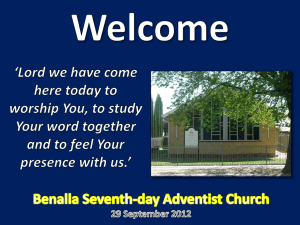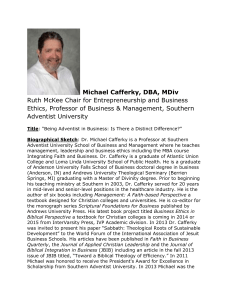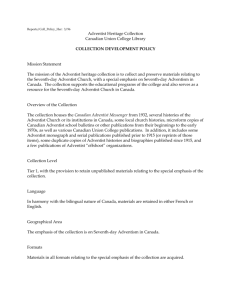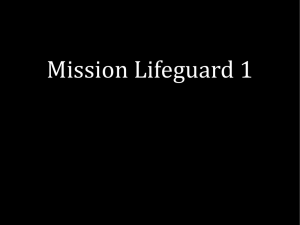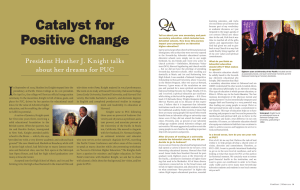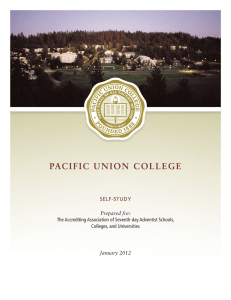Chapter 1 - Adventist University of the Philippines
advertisement
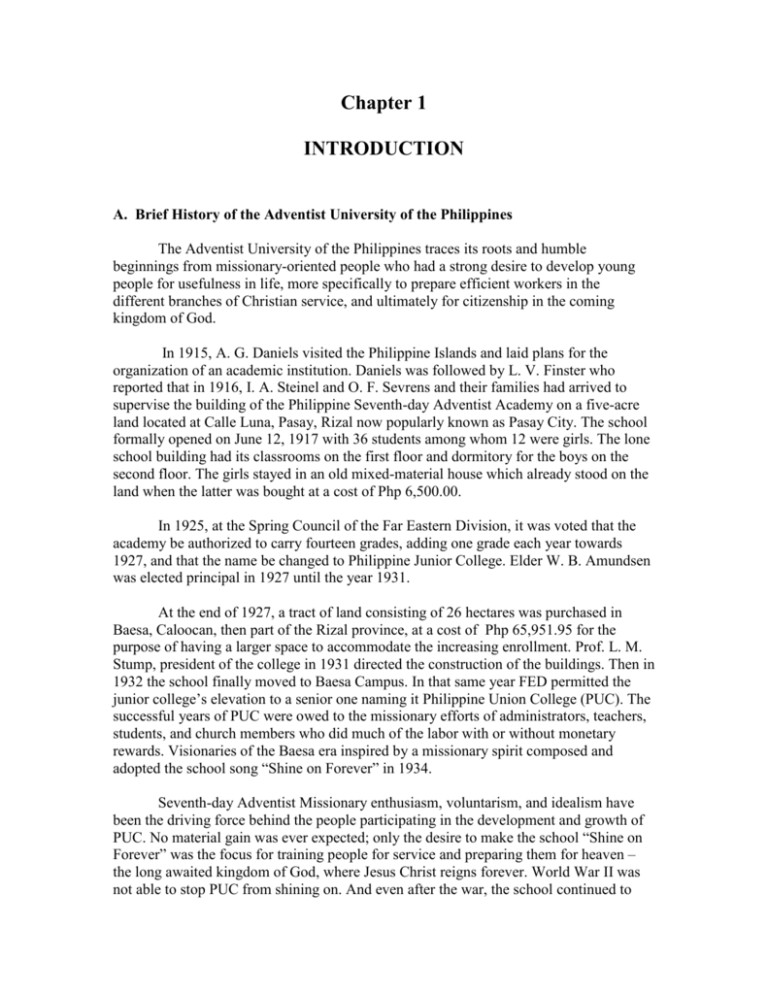
Chapter 1 INTRODUCTION A. Brief History of the Adventist University of the Philippines The Adventist University of the Philippines traces its roots and humble beginnings from missionary-oriented people who had a strong desire to develop young people for usefulness in life, more specifically to prepare efficient workers in the different branches of Christian service, and ultimately for citizenship in the coming kingdom of God. In 1915, A. G. Daniels visited the Philippine Islands and laid plans for the organization of an academic institution. Daniels was followed by L. V. Finster who reported that in 1916, I. A. Steinel and O. F. Sevrens and their families had arrived to supervise the building of the Philippine Seventh-day Adventist Academy on a five-acre land located at Calle Luna, Pasay, Rizal now popularly known as Pasay City. The school formally opened on June 12, 1917 with 36 students among whom 12 were girls. The lone school building had its classrooms on the first floor and dormitory for the boys on the second floor. The girls stayed in an old mixed-material house which already stood on the land when the latter was bought at a cost of Php 6,500.00. In 1925, at the Spring Council of the Far Eastern Division, it was voted that the academy be authorized to carry fourteen grades, adding one grade each year towards 1927, and that the name be changed to Philippine Junior College. Elder W. B. Amundsen was elected principal in 1927 until the year 1931. At the end of 1927, a tract of land consisting of 26 hectares was purchased in Baesa, Caloocan, then part of the Rizal province, at a cost of Php 65,951.95 for the purpose of having a larger space to accommodate the increasing enrollment. Prof. L. M. Stump, president of the college in 1931 directed the construction of the buildings. Then in 1932 the school finally moved to Baesa Campus. In that same year FED permitted the junior college’s elevation to a senior one naming it Philippine Union College (PUC). The successful years of PUC were owed to the missionary efforts of administrators, teachers, students, and church members who did much of the labor with or without monetary rewards. Visionaries of the Baesa era inspired by a missionary spirit composed and adopted the school song “Shine on Forever” in 1934. Seventh-day Adventist Missionary enthusiasm, voluntarism, and idealism have been the driving force behind the people participating in the development and growth of PUC. No material gain was ever expected; only the desire to make the school “Shine on Forever” was the focus for training people for service and preparing them for heaven – the long awaited kingdom of God, where Jesus Christ reigns forever. World War II was not able to stop PUC from shining on. And even after the war, the school continued to radiate with the growing number of graduates topping the Nursing National Board examinations and excelling in the field of Science, especially in Biology, and in the various academic fields. The ever multiplying number of PUC enrollment has inspired the administration to purchase yet a bigger property which comprises 165 hectares of land located at Puting Kahoy, Silang, in the province of Cavite in 1972. The same missionary spirit that inspired the pioneers in the past, has stimulated the administrators, faculty, and students to work hard, sacrifice time, energy, and effort; leaving behind the conveniences of life in the city just to move to the new PUC ‘mountain’ location. The year 1979 saw the first batch of freshmen and sophomore students in this new campus and in 1981, with the movement of the juniors and seniors from Baesa, the campus transfer was completed. Growing is a package of joy, crises, and pain which PUC experienced in all levels of its community existence. Through all these PUC has kept on “shining.” On August 1, 1996 in accordance with Republic Act (RA) No. 7722 and by the virtue of Resolution No. 132-96, Series of 1996, the Commission on Higher Education (CHED) granted PUC the long- awaited University Status entailing the change of the school’s name from Philippine Union College to Adventist University of the Philippines (AUP). “Shine on Forever, Dear AUP,” a compelling command that knows no limit, keeps inspiring University leaders, workers, and students from all over the world to strive harder to reach the heights of excellence. Students kept on topping board exams and other academic competitive tests which helped pave the way for the University to acquire Deregulated Status on October 22, 2001 and to eventually be awarded an Autonomous Status on October 27, 2003 for the meritorious achievement in the provision of instruction, conduct of research, community extension service, high performance of graduates in licensure examinations, and for maintaining a tradition of integrity, excellence, and untarnished reputation in educational service. Arts and Sciences, Business, Education and Nursing Programs are accredited Level III; Accountancy, Master in Business Administration and Master of Arts in Education Programs are accredited Level II by the Association of Christian Schools, Colleges and Universities Accrediting Agency, Inc. (ACSCU-AAI). AUP is accredited as a Level III institution by the Accrediting Association of Seventh-day Adventist Schools, Colleges and Universities with headquarters at the General Conference of Seventh-day Adventists, Silver Spring, Maryland, USA. Administrators, faculty, staff, students, and the Seventh-day Adventist Church unwaveringly rally behind Adventist University of the Philippines in its commitment to its Mission, Vision, Philosophy, and calling to “Shine on Forever.” B. About AUP Adventist University of the Philippines is a private institution of higher learning, a Christian boarding school dedicated to the pursuit of academic excellence and Christian values. AUP’s aim is to “train people for service and prepare them for eternity” C. Philosophy The work of education and the work of redemption are one: to restore in man the lost image of his Maker through the harmonious development of his mental, physical, social, and spiritual faculties. D. Mission The Adventist University of the Philippines exists to provide quality Christian education that facilitates the growth of students so that they may lead lives that are personally satisfying and may contribute to the welfare of the church and the society that sustain them. E. Vision As a Bible-based institution of higher learning, AUP envisions to become a world- class center of academic and Christian excellence. F. Strategic Goals 1. To develop spiritual programs which will lead members of the University community to a saving, growing relationship with God and a loving, caring relationship with each other. 2. To create a conducive learning environment that will stimulate high quality educational experience for faculty, staff and students in a Christian setting. 3. To foster an academic climate that will promote excellence in research and publication, that will invigorate both undergraduate and graduate education. 4. To attract, develop, and retain competent faculty and staff who will be committed to the philosophy, mission, vision, and values of the University. 5. To create an environment that will be proactive and responsive to the needs of students. 6. To instill a positive work attitude in students. 7. To establish an efficient and effective regular communication with stakeholders to enhance the image of the University and to establish the goodwill to support its programs. 8. To expand the internal and external sources of funding the University programs. 9. To provide efficient and cost-effective services by the support services departments. 10. To collaborate with the community, constituency, and stakeholders in the provision of academic and spiritual outreach programs, and humanitarian services. G. General Objectives As the University approaches the ideals expressed in the preceding philosophy, the educational community will demonstrate the following behaviors as evidenced by: 1. Relationship to God and to fellowmen a. A knowledge and love of God as the Creator and Redeemer of mankind by the study of God’s Word—the Holy Bible. b. An abiding love for one’s country, making it a peaceful and safe place to live in, leading one to do all he/she can to preserve and improve its natural resources. c. A deep love and respect for fellow men with efforts to make life comfortable, enjoyable, and meaningful to everyone. d. A high regard and respect for human life, doing all one can to preserve and prolong it. 2. Curriculum and Instruction a. Meeting the needs of the clientele through systematic evaluation and revision of the curricula. b. Utilizing the best instructional materials and methods to ensure quality education. c. Employing qualified and competent faculty and staff in the teaching and educational community. d. Upgrading instructional facilities to enhance student learning, leading to a higher quality of education. e. Conducting research to help improve the University and the community. 3. Leadership Capabilities and Management Commitment a. Leading out in projects for community environment. b. Developing management skills to mobilize people for self-reliance and community services. c. Educating the community to become responsive to change and development. 4. Healthy Lifestyle a. Understanding, appreciating, and applying the basic principles of healthful living as presented in the Bible and the Spirit of Prophecy. b. Cultivating a lifestyle that will guarantee optimum health. c. Educating the people on healthful living in their communities. 5. Community Extension Services a. Instructing the educational community on community extension services. b. Developing leadership and management skills in spearheading community extension service projects. 6. Sustainable Development a. Developing the right attitude and appropriate knowledge in conserving, protecting, and enhancing the environment. b. Exercising leadership skills in the communities to serve, to protect, and to enhance the environment toward sustainable development. c. Initiating activities and research toward sustainable development. 7. Academic Linkages a. Fostering and maintaining linkages with other local and international academic institutions b. Forging and maintaining linkages with government and non-government entities in and out of the Philippines. c. Upgrading instructional facilities so students can acquire quality education. d. Conducting research to help improve the University and the community. 8. The Value and Dignity of Labor a. Understanding the Biblical instruction about labor. b. Knowing the values and benefits of labor. c. Participating in activities that will improve labor skills. d. Providing opportunities for work education. e. Improving the work education program. 9. Preparation of Graduates a. Acquiring skills and knowledge essential to scholastic progress, self- reliance, and economic independence. b. Showing competence in the use of the mental, physical, social, and spiritual faculties in the pursuit of knowledge to improve oneself and the quality of human life. c. Total commitment to the use of acquired knowledge, developed attitudes, and learned skills for the service of God and one’s community.
